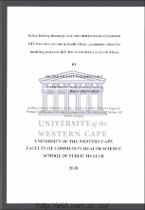| dc.contributor.advisor | Jackson, Debra | |
| dc.contributor.author | Woldesenbet, Selamawit | |
| dc.date.accessioned | 2022-10-10T11:17:52Z | |
| dc.date.available | 2022-10-10T11:17:52Z | |
| dc.date.issued | 2008 | |
| dc.identifier.uri | http://hdl.handle.net/11394/9347 | |
| dc.description | Magister Public Health - MPH | en_US |
| dc.description.abstract | Background: Mother-to-child HIV transmission is a significant public health problem
, especially in Southern Africa. South Africa is the second highest burden country globally
with 71 000 infants being HIV infected every year. The aim of this study was to identify
and measure the influence of risk factors of late postnatal HIV transmission and/or
mortality among infants born to HIV positive mothers.
Study design: Historical cohort data collected during 2002 - 2004 from 3 purposively
selected PMTCT sites in South Africa (namely: Rietvlei, Umlzai and Paarl) is used.
These three sites are purposively selected to reflect different HIV prevalence,
socioeconomic and geographical locations. A total sample size of 469 mother-infant pairs
were followed for 36 weeks. | en_US |
| dc.language.iso | en | en_US |
| dc.publisher | University of the Western Cape | en_US |
| dc.subject | Infant feeding | en_US |
| dc.subject | HIV free survival rate | en_US |
| dc.subject | Post natal HIV free survival | en_US |
| dc.subject | HIV transmission | en_US |
| dc.title | Infant feeding strategies and other determinants of postnatal HIV-free survival rate in South Africa: Parameter values for modeling postnatal HIV-free surviving rate in South africa | en_US |
| dc.rights.holder | University of the Western Cape | en_US |

